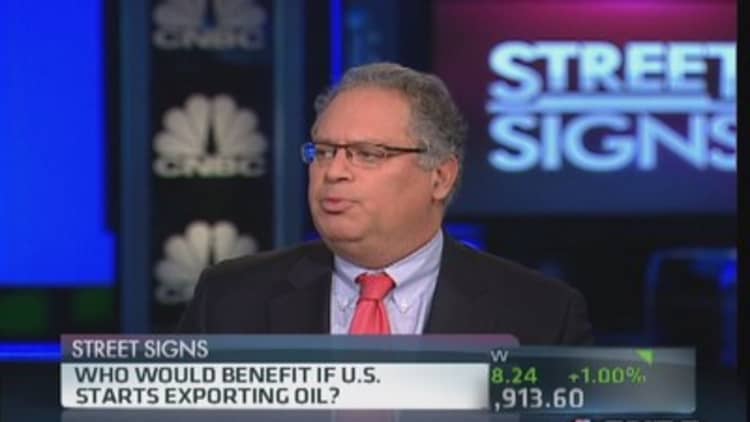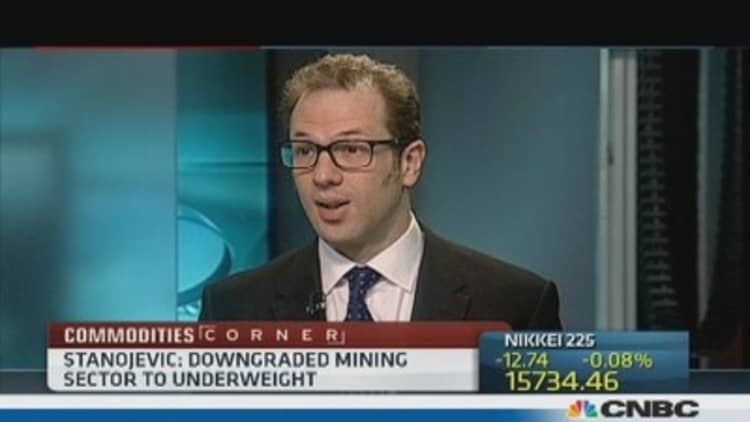America's shale-driven oil boom is expected to drive domestic crude output to a 43-year record in 2015, according to the International Energy Agency (IEA), and many experts now forecast the U.S. becoming completely energy independent by 2020.
All of which raises the question, what will the U.S. do with the surplus?
One idea being posited by many energy producers and their lobbyists is to raise the ban on U.S. oil exports, a set of restrictions that date back to the Arab Oil Embargo of 1973. Such a move, producers say, could lower energy prices for U.S. consumers by reducing American reliance on foreign oil, and in the process reverse a ban that's antiquated anyway.
(Read more: Shell shock: Oil giant warns of 'significantly lower' profit)
At first glance it might appear that exporting U.S. crude would be positive for energy producers and the greater U.S. economy, but there's another side to that argument—and it's also coming from within the industry.
Refiners are arguing that lifting the ban could actually have an adverse effect: Their theory is that exporting oil could create an environment of competitive bidding for U.S. oil in the international market—which would in turn keep prices elevated or even raise them.

While oil majors like Exxon and Chevron support lifting the ban, just last week Valero became the first major refiner to openly oppose relaxing the restrictions. Analysts say that for Valero, higher prices would mean its refining costs would increase, potentially squeezing margins.
"The debate over exporting is dividing up the pie between the producers and the refiners. If we export, producers can access higher-priced world markets. On the other hand, refiners will see raw material cost advantages dissipate," said Andy Lipow, president of Lipow Oil Associates.
Chevron confirmed that it supports a lift of the ban, but had no further comment. Exxon did not respond to requests for comment, but the company last month took its case for exports to reporters.
"We are not dealing with an era of scarcity, we are dealing with a situation of abundance," Ken Cohen, Exxon's vice president of public and government affairs, told The Wall Street Journal. "We need to rethink the regulatory scheme and the statutory scheme on the books."
(Read more: Fight in Iraq has oil traders holding their breath)
Recently, domestic crude futures have been volatile as a result of global growth forecasts, weekly supply numbers and even geopolitical events. But still, traders speculate that the market isn't anticipating a lift of the ban despite major lobbying efforts.
"Currently the market isn't pricing in a lift of the export ban," said Jim Iourio, managing director of TJM Institutional Services. "But the market would make the assumption that removing the export ban could push prices higher by opening up competitive bidding to U.S. oil. Refiners are generally against lifting the ban because it could increase the price of the oil they buy."
What 'energy independence' really means
If the U.S. exports, what will likely happen is domestic prices will rise to the global level because global demand is growing. The product the U.S. would export is light sweet crude, and that supply would have to be replaced by heavier crude at home. Where would that come from?Andy LiposPresident, Lipow Oil Associates
Also key is what, exactly, is meant by "U.S. energy independence." Lipow said that the current forecast isn't just about crude production, but also includes other energy sources like natural gas and coal.
"In the U.S., we produce 8.2 million barrels per day of crude and we import 7 to 7.5 million barrels per day. We have a long way to go on the crude side to be energy independent in terms of crude oil," said Lipow. "When you consider growing production in the U.S., Canada and Mexico, you can see how North America could be crude independent in just several years, but that would still mean importing from our neighbors, rather than the Middle East."
As long as U.S. crude production is roughly in line with U.S. crude imports, the argument for exporting falls apart. according to experts.
"In a competitively priced market, it seems that oil would be bought at the closest point to its consumption. It's illogical to assume that significant amounts of oil would be exported while an equal amount was being imported," said Iourio.
Taking that point even further to pricing, some analysts say that exporting will depend heavily on the price of U.S. crude under current market conditions. Those who subscribe to this view say that the U.S. exporting crude story is a nonstarter—unless crude prices fall and fall hard. Prices would have to collapse to $70 or lower to see the ban on crude exports lifted.

Some point to natural gas as an export model, but other experts say that rationale is flawed: Natural gas is exportable because many countries are short on gas, and the U.S. is long on gas. Liquid natural gas is moving toward becoming a more global market—but it's still far from the crude oil markets, which are completely global already.
These analysts caution that even if we do reach a price level and an equilibrium point in the future where it makes sense to export crude, the act of exporting itself could take prices back up.
"What would happen if we export is that domestic crude oil prices would rise to the world market level. That would probably mean that Brent crude prices (currently the international benchmark) could come under pressure," said Lipow. "That would be expected because U.S. crude would be competing with Brent."
(Read more: Obama's manufacturing revival: Is the gas missing?)
Lipow argued that the export logic is somewhat circular.
"If the U.S. exports, what will likely happen is domestic prices will rise to the global level because global demand is growing," he said. "The product the U.S. would export is light sweet crude, and that supply would have to be replaced by heavier crude at home. Where would that come from? The heavy crude to replace light sweet crude exports would have to come from the Middle East. Ironically we could end up becoming more dependent on OPEC crude."
—By CNBC's Jackie DeAngelis. Follow her on Twitter @JackieDeAngelis

